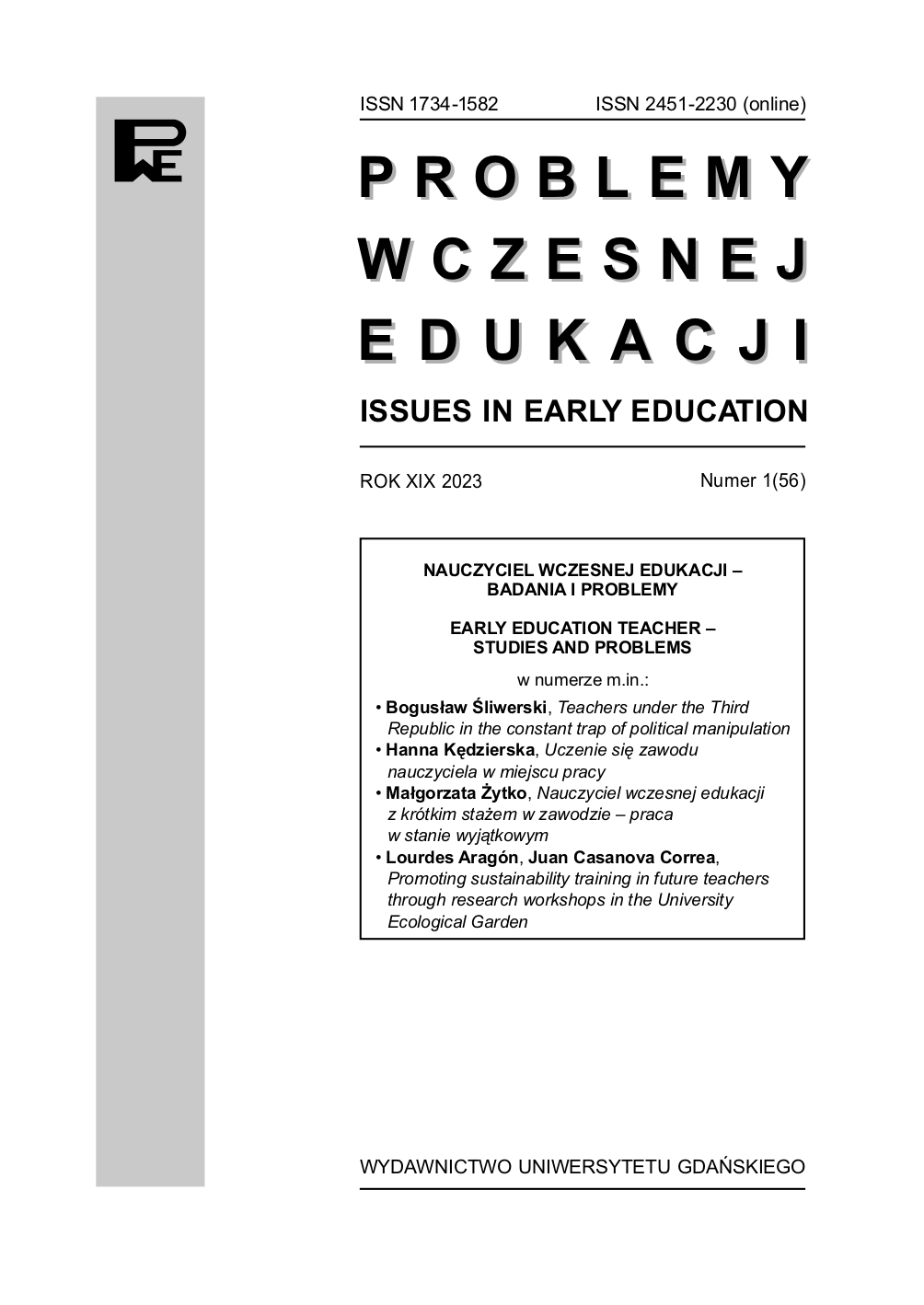Evidence-based practices in teaching
DOI:
https://doi.org/10.26881/pwe.2023.56.06Słowa kluczowe:
edukacja oparta na dowodach, kształcenie przyszłych nauczycieli, badania w działaniuAbstrakt
This article presents the results of the implementation of the Erasmus Plus project (KA203 financed by the European Union, contract number 2019-1-NL01-KA203-060339) Research in Teacher Education (RiTE). The aim of the project was to promote and facilitate pre-service teachers to create and undertake evidence-based practices in teaching science, technology, engineering, and mathematics (STEM). In the RiTE project, pre-service teachers were encouraged to use evidence from educational and scientific research and to experiment and introduce didactic innovations in teaching and learning processes. Although it has its justification in the tradition of thinking about science, evidence-based practice is not yet consciously applied in school practice. In the article, we present both the theoretical framework for such practices, and the results of qualitative research – an analysis of interviews conducted with students, future teachers, and novice teachers involved in the project. The presented results show changes in the context of an understanding of evidence and what evidence-based practices are in the teaching process and the vision of such teaching presented by the respondents.
Downloads
Bibliografia
Borek A. (2012), Nauczyciel badacz, nauczyciel profesjonalista. In: G. Mazurkiewicz (red.), Jak być jeszcze lepszym? Ewaluacja w edukacji. Kraków, Wydawnictwo Uniwersytetu Jagiellońskiego.
Breckon J., Dodson J. (2016), Using evidence. London, Alliance for Useful Evidence.
Cranney J., McDonald F. (2012), Evidence-Based Learning. In: N.M. Seel (ed.), Encyclopedia of the Sciences of Learning. New York, Springer Science & Business Media.
Day Ch. (2005), Rozwój zawodowy nauczycieli. Gdańsk, Gdańskie Wydawnictwo Pedagogiczne.
Driver R., Leach J., Millar R., Scott P. (1996), Young People’s Images of Science. Buckingham, Open University Press.
Duyar I., Gumus S., Bellibas M.S. (2013), Multilevel analysis of teacher work attitudes: The influence of principal leadership and teacher collaboration. “International Journal of Educational Management”, 27(7).
Dylak S. (2013), Architektura wiedzy w szkole. Warszawa, Difin.
Hodkinson P. (2008), Scientific research, educational policy and educational practice in the United Kingdom: the impact of the audit culture on further education. “Cultural Studies – Critical Methodologies”, 8.
Ion G., Sirvent E.L. (2022), Teachers’ perception of the characteristics of an evidence-informed school: initiative, supportive culture, and shared reflection. “School Effectiveness and School Improvement”, 33(4).
Kattmann U. (2007), Didaktische Rekonstruktion – eine praktische Theorie. In: D. Krüger, H. Vogt (Hrsg.), Theorien in der biologie didaktischen Forschung: Ein Handbuch für Lehramts studenten und Doktoranden. Berlin, Springer-Verlag.
Kattmann U., Duit R.H., Gropengießer H., Komorek M. (1997), Das Modell der Didaktischen Rekonstruktion – Ein Rahmen für naturwissenschafts didaktischer Forschung und Entwicklung. “Zeitschriftfür Didaktik der Naturwissenschaften”, 3(3).
Kędzierska H. (2015), Novice Teachers: The Process of “Anchoring” in the Teaching Profession, “Forum Oświatowe”, 54(2).
Kędzierska H. (2018), Socjalizacja profesjonalna nauczycieli na starcie kariery zawodowej – druga strona medalu. “Zarządzanie Publiczne”, 41(1).
Khasawneh S., Omari A., Abu-Tineh A.M. (2012), The relationship between transformational leadership and organizational commitment: The case for vocational teachers in Jordan. “Educational Management Administration & Leadership”, 40(4).
Kołodziejski M. (2014), Nauczyciel jako refleksyjny i krytyczny badacz w perspektywie procesów autoewaluacyjnych. “Studia Pedagogiczne. Problemy Społeczne, Edukacyjne i Artystyczne”, 24.
Lemke J., Sabelli N. (2008), Complex systems and educational change: Towards a new research agenda. “Educational Philosophy and Theory”, 40(1).
Mayer R.E. (1992), Cognition and instruction: Their historic meeting within educational psychology. “Journal of Educational Psychology”, 84.
Millar R., Osborne J.F. (eds.) (1998), Beyond 2000: Science Education for the Future. London, King’s College London.
Osborne J.F. (2002), Science without Literacy: a ship without a sail? “Cambridge Journal of Education”, 32(2).
Osborne J., Erduran S., Simon S. (2004), Enhancing the quality of argument in school science. “Journal of Research in Science Teaching”, 41(10).
Park S., Oliver J.S. (2008), Revisiting the conceptualisation of pedagogical content knowledge (PCK): PCK as a conceptual tool to understand teachers as professionals. “Research in Science Education”, 38.
Patterson B.J., Klein J.M. (2012), Evidence for teaching: what are faculty using? “Nursing Education Perspectives”, 33(4).
Siemak-Tylikowska A., Kwiatkowska H., Kwiatkowski S.M (red.) (1998), Edukacja nauczycielska w perspektywie wymagań zmieniającego się świata. Warszawa, Wydawnictwo Akademickie HAK.
Strykowski W. (2005), Kompetencje współczesnego nauczyciela. “Neodidagmata”, 27/28.
Tait K.J., Boulton-Lewis G.M. (1993), Collaborative action research in early mathematics education. “The Australian Educational Researcher”, 20(1).
Taraszkiewicz M. (2001), Jak uczyć jeszcze lepiej! Szkoła pełna ludzi. Poznań, Arka.
Welskop W. (2013), Rola nauczyciela-tutora w procesie wspierania rozwoju osobistego uczniów. Siedlce, Wydawnictwo UPH w Siedlcach.
Wiśniewska-Kin M., Rybska E. (2020), Świat w optyce dziecka: reprezentacje obiektów przyrodniczych z dziecięcej perspektywy. Łódź, Wydawnictwo Uniwersytetu Łódzkiego.
Worrell F.C., Casad B.J., Daniel D.B., McDaniel M., Messer W.S., Miller H.L., Jr., Prohaska V., Zlokovich M.S. (2010), Promising principles for translating psychological science into teaching and learning. In: D.F. Halpern (ed.), Undergraduate education in psychology: A blueprint for the future of the discipline. Washington, DC, American Psychological Association.
Internet sources
Biesta G. (2007), Why what works, won’t work: Evidence-based practice and the democratic deficit in educational research. “Education Theory”, 57(1), https://onlinelibrary.wiley.com/doi/pdfdirec t/10.1111/j.1741-5446.2006.00241.x, 30.05.2023.
Nelson J., Campbell C. (2017), Evidence-informed practice in education: meanings and applications. “Educational Research”, 59(2), https://www.tandfonline.com/doi/full/10.1080/00131881. 2017.1314115, 30.05.2023.

 Uniwersyteckie Czasopisma Naukowe
Uniwersyteckie Czasopisma Naukowe





